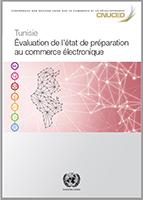
The eTrade Readiness Assessment of Tunisia provides a detailed analysis of the Tunisian digital ecosystem and a set of recommendations in seven key areas for the development of e-commerce. In its development process, it has helped to strengthen inter-ministerial coordination and high-level policy support to foster the emergence of an enabling environment for e-commerce development.
The potential of e-commerce in Tunisia is supported by the progress made in recent decades, accelerated since 2020 by the COVID-19 pandemic. In terms of connectivity, rates of penetration and use of the Internet and a robust mobile network, which are all well above the global average. Tunisia is also a pioneer and leader in the region in the adoption of legislation dedicated to e-commerce.
However, several obstacles still prevent the country from fully unleashing the potential of e-commerce, including:
- The logistical dimension of trade and in particular the unstructured and unregulated express parcel delivery sector
- Rigid foreign exchange regulations, which deprive Tunisia of a huge potential in terms of cross-border e-commerce, especially with European markets as consumers and traders face difficulties in accessing foreign currency accounts and international bank cards.
- The gap between the skills sought by companies in the digital sector and the qualifications offered by training programs.
- The limited access to financing, which represents a major obstacle for e-commerce operators in Tunisia.
The assessment highlights that Tunisia can capitalize on the potential of e-commerce, both domestic and cross-border, by implementing the appropriate reforms to relax exchange regulations, strengthen inter-ministerial dialogue on issues related to e-commerce and ensure coordination for an effective implementation of the key priority e-commerce initiatives.
To achieve this, the development of an Action Plan is underway, following the Assessment and under the leadership of the Ministry of Commerce and Export Development. The Plan should provide an operational tool for the Government to facilitate the implementation of the recommendations contained in the assessment. UNCTAD is supporting this process and helping to ‘connect the dots’ between national and international partners, strengthening synergies with digital cooperation programmes on the ground, in collaboration with the United Nations Resident Coordinator Office (UNRCO) in Tunis.
The "Digital Transformation Program", implemented by the Deutsche Gesellschaft für Internationale Zusammenarbeit (GIZ) GmbH on behalf of the German Federal Ministry for Economic Cooperation and Development (BMZ), provides the financial support for the eT Ready Assessment and the development of the Action Plan.


